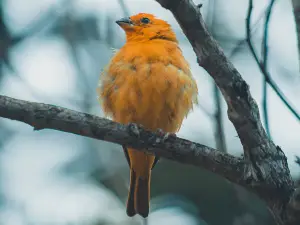
Birds may sometimes express some bizarre behaviours in the eyes of humans but wild animals seldom do anything without a reason behind it, and this includes birds puffing up their feathers. You may have seen this phenomenon in birds and wondered why they do this. Well this article will help you figure that out. If you’re a bird lover, bird owner or are simply curious then this article is for you.
Birds puff up their feathers to either communicate, to keep them from the cold or to prepare themselves for sleep. Puffing up their feathers traps air which becomes a warm layer between the bird’s skin and the feathers, this keeps the bird warm. It also makes them look bigger in a fight.
Table of Contents
Why do birds puff up their feathers?
If you own a pet bird, you might have seen it occasionally puff up its feathers, you may wonder why it does that. According to experts, when a bird puffs up its feathers, it is most likely feeling cold.
While humans can wear sweaters, jackets, and thick clothes to keep themselves warm in the winter, birds use what they have to stay warm – their feathers. Their feathers work as insulation. When they puff up their feathers the air gets trapped between their skin and the feathers, this warms up the bird.
Bird species like parrots might also puff up their feathers when they feel sleepy. Thus if your pet parrot is puffing up its feathers on a hot summer afternoon, it could be telling you that it’s tired and needs to nap.
Additionally, birds fluff up their feathers to make themselves look bigger during a fight, if they look bigger than their opponent or at least bigger than what the opponent can handle then the opponent may back away.
What do birds do to keep warm?
During the winter, bird species that don’t migrate find warm places to nest. While in their nests, these creatures fluff up their feathers to trap their body’s heat. Their feathers also help prevent the cold from getting to them, this is similar to a human wearing very thick clothes in the winter.
You might ask, what happens to their legs and bills? Studies have shown that birds keep their legs and feet warm by standing on one leg and then switching to the other after a while. Tucking their bills into their shoulder feathers allows them to inhale warm air.
But it doesn’t end there. Birds also keep warm during extreme colds by shivering or entering torpor. Chickadees, hummingbirds, doves, and swifts are some of the popular bird species that use torpor to survive the winter.
Can a bird die of cold?
The chance of a bird dying of cold is very slim, especially if it is healthy, and has increased its fat reserves in the months before winter. A bird that has enough fat reserves can produce sufficient heat to keep itself alive through the winter. Therefore, a bird is likely to die of cold if it has no fat reserve. A bird might also freeze to death if it is sick and lacks the energy to shiver or enter torpor on extremely cold days.
Can a frozen bird come back to life?
It’s important to note that a frozen bird may not be dead. During extremely cold days, birds enter torpor. In this state, they might appear to be lifeless, much like an animal in hibernation. Anyone who stumbles on them in this state would think that they are dead.
To find out if a bird has really frozen to death, you should use a blow dryer on it. If it isn’t dead, the hot air from the blow dryer should revive it. Another way to tell if a bird has frozen to death is to touch it. If the body is stiff, the bird has died and can’t be brought back to life.
Why do birds ruffle their feathers?
According to experts, a bird will ruffle its feathers to keep itself warm during cold periods. Birds will also ruffle their feathers after preening to remove specks of dirt.
Conclusion
In conclusion, birds will puff up their feathers for a number of reasons. They may puff up their feathers to keep warmth, to signal they are about to sleep or to appear larger when they are in a confrontation with another animal.
Another thing they do to keep warm during the winter is to fluff up their nests to create a warmer cosier nest. They also have fat reserves which keep them warm during the winter. If the bird seems frozen it may simply be in torpor.
If you enjoyed this article then you may also be interested in other bird related articles. Here are some articles that you may be interested in: how to relocate a birds nest with eggs, can you hatch eggs with a heating pad, can pigeons see at night, how to sterilize a birds nest

